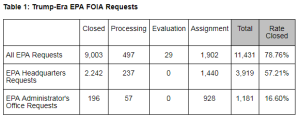A Sunshine Week Primer on the Agencies Still Trying to Weaken FOIA: FRINFORMSUM 3/1/2018
 Agencies Still Trying to Weaken the FOIA
Agencies Still Trying to Weaken the FOIA
Federal agencies are still trying to restrict access to information and weaken the Freedom of Information Act in a variety of ways. With Sunshine Week – the annual, week-long celebration of access to information – around the corner, I wanted to highlight some of the most egregious ways agencies have tried to turn the clock back on FOIA in the last calendar year in an effort to ensure that these efforts continue to be unsuccessful.
1.The Securities and Exchange Commission – Trying to Make It Harder for Students to File FOIA Requests
Earlier this year the SEC sought comments on a proposed rule that would make students and academics jump through more hoops – and potentially pay more money – to file FOIAs.
Currently, to be recognized as filing a FOIA request on behalf of an educational institution and to qualify for favorable fee status, the FOIA only requires that the affiliated organization “have a purpose of scholarly or scientific research.” The SEC, however, wants to make it harder to qualify. The proposed rule (comments were due by Feb. 2 and we are awaiting the final ruling) would require that “A requester in this fee category must show that the request is authorized by, and is made under the auspices of, an educational institution and that the records are not sought for a commercial use, but rather are sought to further scholarly research.”
As reported in JD Supra, this “makes two potentially important changes to the statutory requirement. First, the statute merely requires the disclaimer of a commercial purpose, the SEC’s rule requires a showing of scholarly purpose. Second, the SEC’s requirement narrows the noncommercial purposes to only ‘scholarly research’. While this may seem little more than a cavil, the SEC should not be allowed to erode the FOIA by subtly shifting statutory requirements.”
2. The Department of the Interior and the Bureau of Land Management – Trying to Limit the Number of Requests a Person or Organization Can Submit.
The Bureau of Land Management recently made headlines for its attempts to simultaneously limit the number of FOIA requests a person or organization can submit and increase the costs of filing a request with the agency so it “can recover all of its direct costs.” The suggestion implies that BLM is receiving more FOIA requests than it can handle and that BLM would see any of the money the agency collects from FOIA fees – two things that are not true.
The Washington Post reported in October 2017 on notes from a closed Interior Department meeting that show the genesis of the FOIA-weakening discussion. According to the Post, BLM and DOI representatives “talked about working around environmental analyses that determine whether infrastructure projects harm ecosystems, about stripping conservation groups of the power to sue the BLM if it wrongly approves a project and about limiting the number of federal Freedom of Information Act requests that allow the public to scrutinize how decisions were made.”
The single best way for agencies to get in front of a growing number of FOIA requests remains the same: posting more records proactively, and the easiest way to cut down on processing times and save resources is to embrace a presumption of openness and let more documents go with fewer time-consuming and unnecessary reviews.
3. The Defense Department – Trying to Expand FOIA Exemptions for Third Year in a Row
In 2017 the Defense Department sought – for the third time in three years – a new FOIA exemption that, if approved, would have allowed the agency to expand the FOIA’s (b)(3) exemption to withhold “military tactics, techniques and procedures (TTP), as well as rules of engagement, that are sensitive but unclassified.” The exemption was proposed in the National Defense Authorization Act of 2018, section 1003 (page 20). The attempt was unsuccessful.
4. House Border Bill Almost Gave CBP Broad FOIA Carve-Out
Last October U.S. Representative Martha McSally (R-AZ) pulled a provision from border bill making its way through the House (H.R. 3548) -that would have exempted Customs and Border Protection (CBP) from FOIA requirements within 100 miles of the border- but only after reporting from the Tucson Sentinel shed light on a move that would have allowed the agency to “operate nearly as secret police, without any public accountability.” McSally, after the story broke, said the transparency carve-out “was ‘not the intent of this bill,’ and offered an amendment to clarify that ‘nothing in that section of this act will allowing waiving of FOIA responsibilities.’” No explanation was provided about the carve-out’s initial inclusion in the bill.
HUD Sees FOIA Office as a Demotion
A Housing and Urban Development official has filed a complaint that she’s been demoted after refusing Secretary Ben Caron’s wife’s efforts to purchase an expensive dining set for his office without proper congressional approval. The demotion? Being sent to the agency’s FOIA office. The New York Times reports that the official “has suffered much humiliation and a loss of reputation, and harm to career advancement, as a result of this retaliatory reassignment” to the FOIA office, which she sees “as an act of retribution.” While at the FOIA office, Foster “expressed concern about the lack of staffing to do basic ‘FOIA and records functions.’” Foster also said she was prevented from handling FOIA requests submitted to the agency by the Democratic National Committee because a Trump appointee believed her a Democrat.
This is the second instance in as many months of high-level agency officials complaining of being sent to the FOIA office – either because the office is understaffed to the point where it cannot be effective or because agency culture reinforces the idea that FOIA work is a punishment. In January State Department officials joked that being sent to the FOIA office was the professional equivalent of being sent to Siberia.
This is also the second time that news has surfaced of agency officials publicly disparaging the effectiveness of FOIA offices that the Department of Justice’s Office of Information Policy and the Office of Government Information Services, as well as the trade association the American Society of Access Professionals, have not publicly pushed back and affirmed the importance of FOIA offices to agencies as a whole.
Surge in FOIA Lawsuits Against the EPA Continues
The Environmental Protection Agency has been the defendant in 55 FOIA cases since Donald Trump’s inauguration, according to data compiled by the FOIA Project and reviewed by Politico. The suits seek a range of information, everything from EPA head Scott Pruitt’s travel schedules and flying habits to information on reversals of Obama-era policies.
For comparison, “Former President George W. Bush’s EPA — hardly a darling of the environmental movement — faced only 57 FOIA lawsuits during his entire presidency, according to the database’s list of cases.” Eleven FOIA suits were filed during the last year of the Obama administration.
The Project on Government Oversight also found that “The agency has been especially slow to resolve information requests directed specifically at Pruitt’s office.”
Public Outcry Over Washington State’s Regressive Public Records Law
Last week Washington state legislators passed an “emergency” retroactive secrecy law that exempts state lawmakers from the Washington Public Records Act. The legislation comes a year after a court challenge from the Associated Press, the Seattle Times, and others fighting that exact exemption, and would likely “stop the case’s progress.” The bill awaits Gov. Jay Inslee’s decision. The governor’s office has received a record-number of calls and emails about the bill; it is possible that even if Gov. Inslee vetoes the bill, the state legislature would nonetheless override it.

Copy of CIA special intelligence assessment on Pinochet’s role in Letelier and Moffitt assassinations.
TBT Pick – Pinochet Personally Ordered Orlando Letelier Assassination
This week’s #TBT pick is chosen with the recent unveiling of the Orlando Letelier monument in Washington, D.C. in mind. Letelier and Ronni Karpen Moffitt were killed in a 1976 car bombing — an assassination ordered by Chilean dictator Augusto Pinochet. A 2016 Archive posting examines the 1987 CIA special intelligence assessment concluding that Pinochet personally ordered an “act of state terrorism” on the streets of the nation’s capital.
Sign Up
Want to stay on top of the latest FOIA news? Click here to sign up for our weekly FRINFORMSUM (Freedom of Information Summary) email newsletter.


Comments are closed.